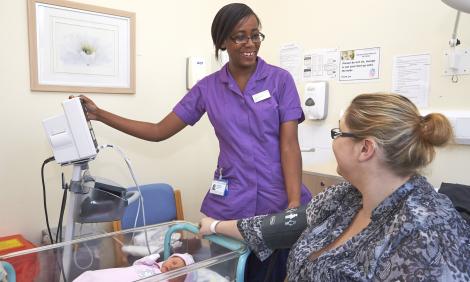How to become a midwife
Our midwives say that their job is a privilege and are honoured to be able to share such a special moment in a family's life.
Applying to become a midwife
The first step to becoming a midwife is to take a degree level programme approved by the Nursing & Midwifery Council (NMC). This may be a full-time undergraduate or postgraduate degree or midwifery degree apprenticeship.
Applications for full-time approved midwifery degree courses are made through UCAS. You should contact individual universities about their part-time courses and how to apply. Our course finder has every midwifery course across the UK.
For midwifery degree apprenticeships, search for vacancies on the NHS Jobs website and the Find an Apprenticeship website

Entry requirements
You're likely to need three A-levels or equivalent level 3 qualifications, such as a T level or BTEC, plus supporting GCSEs. Entry is competitive and high grades at A-level (or equivalent qualifications at level 3) might be needed. Universities may also ask for certain subjects, such as at least one science or social science subject.
As entry requirements can vary, we always recommend contacting universities and employers to find out the qualifications you'll need.
Financial support while studying at university
If you're eligible, you'll receive at least £5,000 to help fund your studies while at university. Best of all, you won't need to pay it back.
-
Universities and employers will normally expect you to attend an interview. You will also need to demonstrate that you have found out about the role of a midwife and understand what the work involves. This is possible through relevant experience. Experience in any healthcare setting is useful but if you can gain it in a midwifery setting, so much the better. Work experience placements can be difficult to find, so alternatives would be to shadow a midwife or talk to a midwife about their role.
You can also hear from midwives in our film and read some of our real-life stories.
The UCAS website allows you to search for courses and view entry requirements. More detailed information about specific courses can be found in university prospectuses and on their websites.
-
If you’re applying for a university programme leading to a role providing NHS healthcare or for a midwifery degree apprenticeship, you’ll be asked to show how you think the NHS values would apply in your everyday work.
Find out more recruiting for values and the NHS Constitution.
-
Approved full-time midwifery degree courses last for three years. Half your time is spent studying at university and half gaining practical, supervised experience in a range of settings. If you are working in a relevant role, it’s possible to take a part-time course lasting five or six years.
Although approved courses must meet the NMC’s standards of education and training, programmes vary in their content, the way they are structured, and how they are taught and assessed. The facilities available and amount of support and supervision may also differ from course to course. Find out more by looking at university websites and prospectuses, attending university open days and contacting admissions staff.
You can also take a look at our information about the support available while on your course.
Degree apprenticeships also combine academic study (at degree level) alongside working in a relevant role, enabling you to meet the standards laid down by the NMC.
-
Passing an NMC-approved training programme will give you an academic degree and professional qualification. In order to practise as a midwife, you must register with the NMC.
The NHS has a student nursing hub with lots of useful information about searching for your first role, preparing your application and for interview and getting ready for your first nursing job.
Job vacancies for registered midwives are advertised on the NHS Jobs website. If you become a member of The Royal College of Midwives you can also find jobs advertised in their journal or on their website. General information on looking for work can be found in the Career planning section and under Looking for a job.
There are opportunities to work in a range of settings as a midwife and you can progress from one grade or band to another. You’ll need some experience in a more generalist role, but you can specialise in an area that interests you, such as home births or neonatal intensive care. This might involve studying for further qualifications.
To maintain your registration to practise with the Nursing and Midwifery Council, you’ll need to go through the process of revalidation. The process is straightforward and will help you as a nurse or midwife to demonstrate that you practise safely and effectively. You will have to revalidate every three years to renew your registration. Revalidation includes taking part in continuing professional development (CPD). Find out more about revalidation on the NMC microsite




